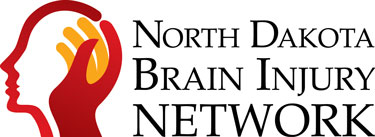Mat Kerzman – Refuse to Sink
 Mat Kerzman was 31 years old, out riding his longboard with a friend, when he
sustained a severe traumatic brain injury (TBI) in the fall of 2013. Longboarding is basically skateboarding
with a longer board. Mat was not wearing a helmet at the time of his injury.
Mat Kerzman was 31 years old, out riding his longboard with a friend, when he
sustained a severe traumatic brain injury (TBI) in the fall of 2013. Longboarding is basically skateboarding
with a longer board. Mat was not wearing a helmet at the time of his injury.
Mat was transported to the local emergency room in Bismarck, North Dakota, then was airlifted to Craig Hospital in Denver, Colorado, where he was in a coma for a week. Following a stay at the hospital, Mat went to QLI in Omaha, Nebraska, for nine months of rehabilitation. He only remembers bits and pieces of his time there. He was then discharged to a nursing home in Mott, North Dakota for five months. Once a spot opened, he was transferred to, what he refers to as the “best TBI facility in North Dakota,” Dakota Alpha run by HIT, Inc., in Mandan.
Mat resides with 19 other residents at one of the state's only TBI residential facilities, where he gets physical therapy (PT), occupational therapy (OT), and physical conditioning therapy (PCT) five days a week. During PT, you can find him walking with a platform walker a few times a week. OT consists of various arm exercises and psychosocial interventions. Mat sees a counselor every two weeks.
He is immensely appreciative of all the staff that work with him on a daily basis, everyone from therapists to certified nursing assistants to kitchen staff. He acknowledges they have very difficult jobs and they work hard to give staff and fellow survivors a positive outlook.
“If you have the power to make someone happy, do it,” Mat says. “The world needs more of that. It doesn't have to be a grand gesture. Giving is a blessing and there are infinite ways to do it. Give a smile through humor, give fist bumps, give people your attention and gratitude. And sometimes it's necessary (and can help) to give people grief sometimes! And then there's always the physical things you can give. Happiness is contagious – let's help spread it!”
He now jokingly compares the way his speech sounds to a donkey. “At least I can joke about it, but seriously, it's the most aggravating.” He has plateaued in the area of speech, so he practices what he has already been taught by the speech therapist, but does not get current speech services.
Tabby
Tabby is what Mat lovingly calls his tablet. Mat learned to operate his tablet mostly by trial and error and teaching himself. He uses a program called Callipeg to make short animated videos and many other programs he plans to present at one of the North Dakota Brain Injury Network's upcoming Webinar Wednesdays. Most recently, he made a video depicting a man longboarding without a helmet. Words across the screen read, “Helmets may not look cool, but they save lives!”
Assistive technology devices, such as tablets, are often a great way for individuals that have sustained a brain injury to connect and interact with the world around them. From post-it notes to tablets, there are many options available. NDBIN's Resource Directory has information on Assistive Technology and Environmental Modification providers, along with a provider perspective video from North Dakota Assistive.
Keeping Cool
“If you feel a part of your body getting warm; stop, count to three, and think before you act,” Mat says. “I can snap at the drop of a dime, so to speak. I'm still working on this with my counselor.” Mat's TBI brought upon emotional dysregulation symptomology that many survivors of brain injury report struggling with throughout their recovery. The Stop-Think-Act model Mat is referring to is commonly taught to survivors.
NDBIN is currently piloting a psycho-educational, seven-week series titled Living Life Fully After a Brain Injury, adapted from Mindsource out of Colorado. The series has a session dedicated to Stop-Think-Act. Impulsivity is an unfortunate side effect from TBI. An impulsive decision is one made very quickly, with little time given to consider the possible outcomes of that decision. Basically, any time we decide something “in the heat of the moment” would be an example of impulsive behavior.
Impulsivity after brain injury will look different for each survivor, but some examples of what it may look like include: interrupting conversations and talking over others; buying things you cannot afford; making hurtful comments; ignoring safety rules, such as looking before crossing the street; or lashing out physically and verbally, without thinking about the consequences.
A brain that has been injured can be retrained, and those impulses can be managed through strategies such as Stop-Think-Act. When survivors learn to control their impulses, they are more likely to avoid unwanted personal, and possibly legal, consequences in the future. NDBIN will continue to update readers on these courses and how you can attend one in the future.
Positivity
Mat's world looks much different now than it did almost 10 years ago, prior to his injury. He is honest when he says he misses sex the most, which many individuals can relate to. Relationships following severe brain injury, especially those of a sexual nature, are more difficult to maintain. NDBIN brought in Kathy O'Connell for the 2022 Mind Matters Conference, who did a two-part series on “How to Support Social and Emotional Growth for Healthy Relationships in People with Disabilities.” Her session was very well received.
Finding the silver lining seems to be Mat's go-to way of looking at things. For example, he doesn't get to attend family Christmas anymore; but then that way he also can't burn any bridges! Mat has taken a tragedy and tried to turn it into something positive in terms of enjoying life and spreading joy.
